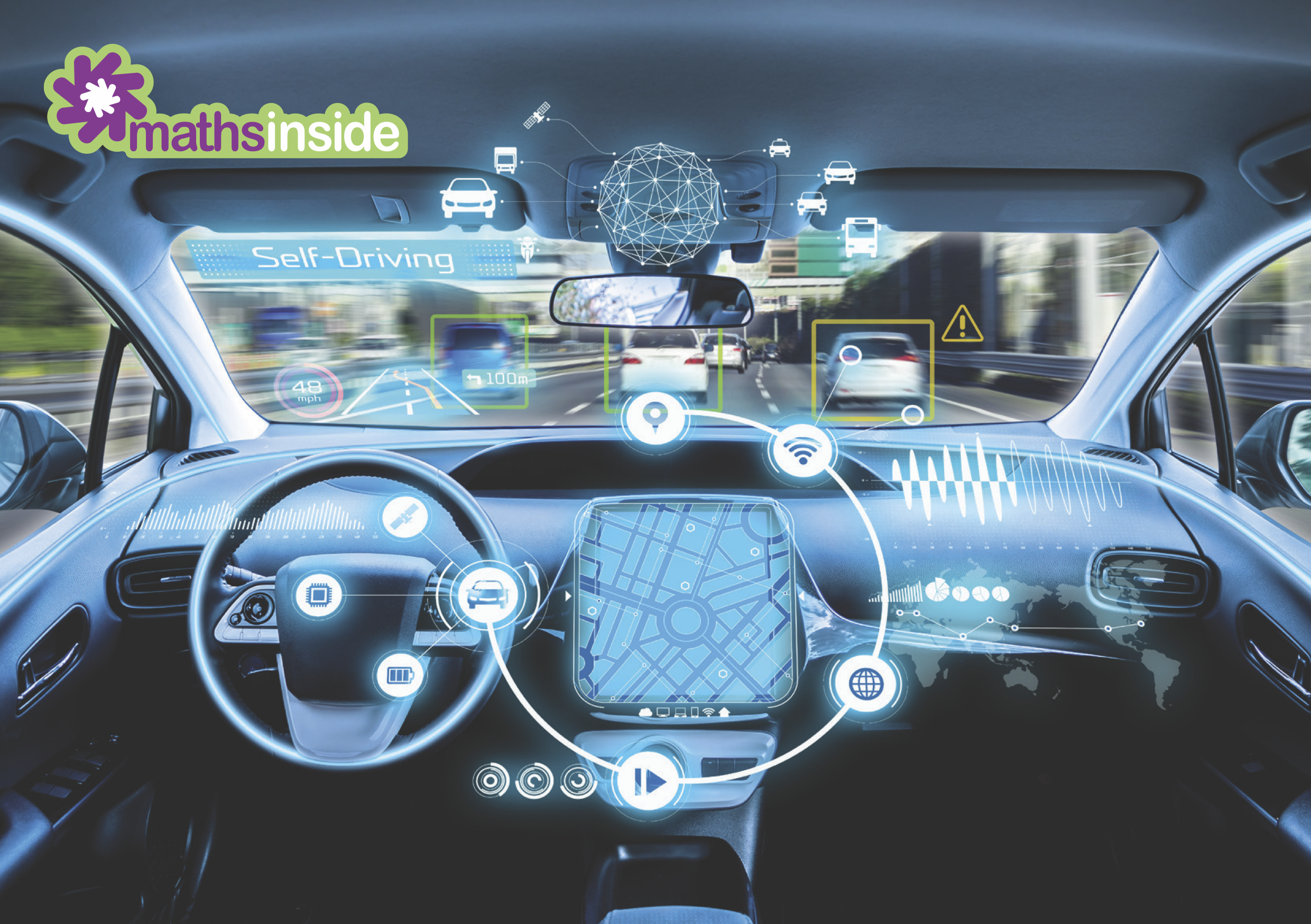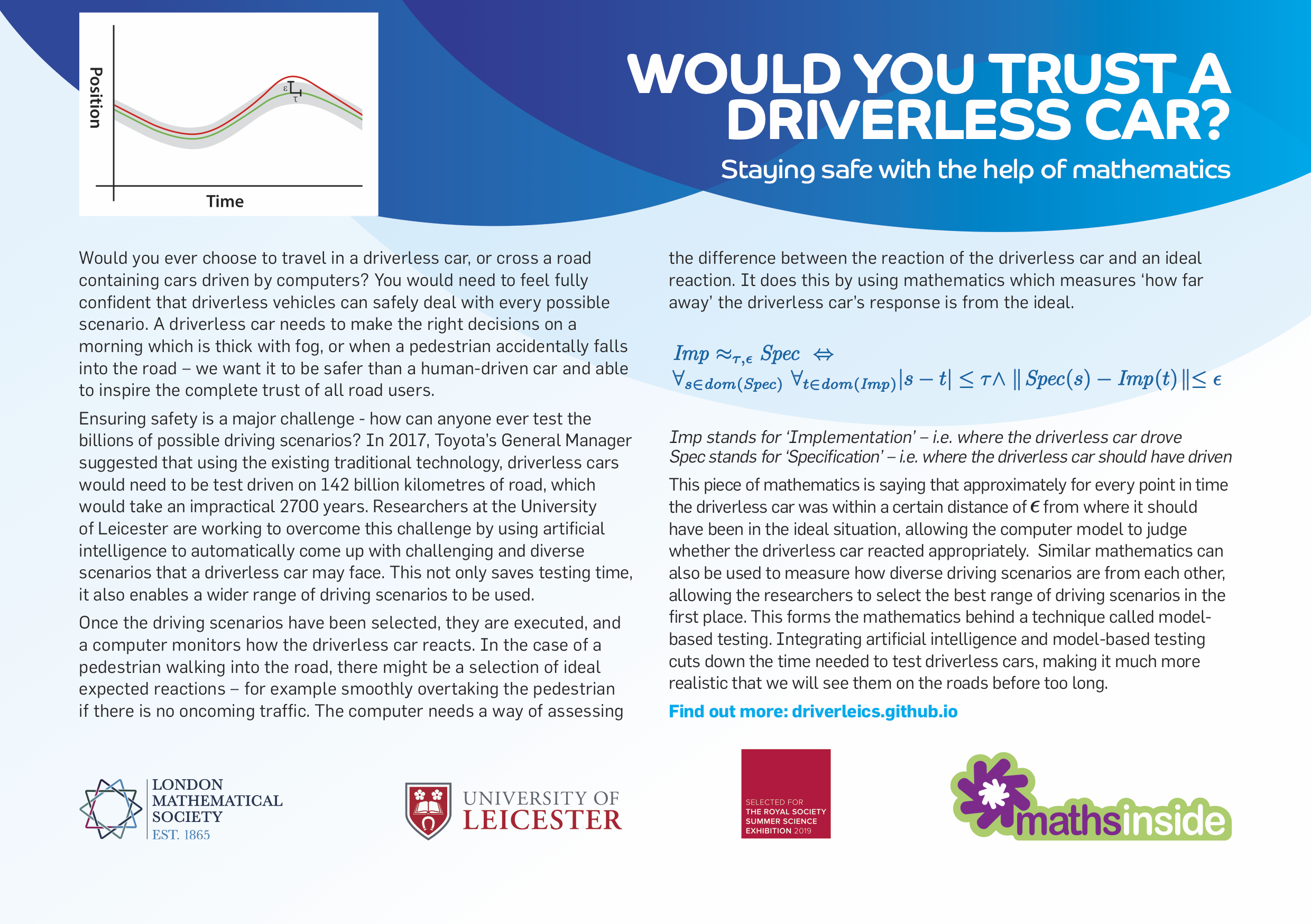Autonomous systems, which encompass a wide range of domains, including but not limited to autonomous vehicles, are rapidly advancing and transforming the future of mobility. The potential to reduce accidents caused by human error, provide access to mobility for a wider range of individuals, and revolutionize various industries are all factors driving this technological transformation.
The DriverLeics team, located within the School of Computing and Mathematical Sciences at University of Leicester, we are dedicated to developing advanced techniques for autonomous systems in complex urban scenarios. Our team is composed of undergraduate and postgraduate students, supported by leading academics with expertise in fields such as safety analysis, model-based software engineering, automated software validation and verification, guidance, navigation, and control (GNC), and robotics. We are committed to ensuring the safety and reliability of these systems through cutting-edge research, utilizing the latest advancements in autonomous technology.
 Daniel Z. Hao
Daniel Z. Hao
 Genovefa Kefalidou
Genovefa Kefalidou
 Neslihan Suzen
Neslihan Suzen
 Abdulqader A.M. Dhafer
Abdulqader A.M. Dhafer
 Jan Oliver Ringert
Jan Oliver Ringert
 Rayna Dimitrova
Rayna Dimitrova
 Bo Yuan
Bo Yuan
 José Miguel Rojas
José Miguel Rojas
 Mohammad Mousavi
Mohammad Mousavi
 Nervo Verdezoto
Nervo Verdezoto
Join us, DriverLeics Team, at the Bright Sparks STEM Fair on 17th June 2023 for an unforgettable dive into the world of AI and robotics. Experience the fascinating operation of an advanced robotic dog, get hands-on with AI object detection, and demystify the mechanics of autonomous vehicles using a 1:8 scale model. This is a unique opportunity to step into the future of technology and see first-hand how these exciting fields are transforming our world. Be there, be curious, and let's discover the magic of technology together!


Dive into the world of AI and get hands-on experience in identifying objects through the eyes of an artificial intelligence model. Learn how machines 'see' and 'understand' objects in their environment.

Step into the world of robotic canines and gain firsthand experience in programming and controlling their movements. Understand the complex mechanics that bring these remarkable machines to life.

Step behind the scenes of the autonomous vehicle revolution. Learn how these self-driving machines navigate complex environments and make decisions in real time, and even try your hand at basic autonomous driving algorithms.
The Royal Society Summer Science Exhibition is a national, high-profile science event
running from July 1st to 7th. The event attracts more than 10,000 visitors from schools and
the general public every year.
What do we present at the Royal Society Summer Science Exhibition?
Our University and research team have earned a stand at the prestigious Royal Society Summer Science exhibition this July and have been tasked with developing an exciting exhibit for the hot topic of trusted autonomous vehicles. We provide general information on autonomous vehicles' technologies together with three interactive activities:
Our exhibit will occupy a prime spot in the largest hall of the exhibit, the Wellcome Trust Lecture Hall. Due to the expected interest in our topic, the Royal Society has granted us the main stage in addition to our stand to build a scale 1:8 track with autonomous vehicles. Our activities will be featured in a film the Royal Society is producing for six selected exhibits. Additionally, we have also been selected as one of three exhibits to appear in the London Mathematical Society's 'Maths Inside Project' leaflet:
• A demo of a 1:8 self-driving car (visitors can control a pedestrian crossing the road)
• A test of visitor's abilities compared to AI abilities in difficult driving situations
• An evolving self-driving AI trained by visitors



Artificial intelligence provides an automated way of assessing and improving safety for trusted autonomous vehicles.

The behaviour of autonomous vehicles follows basic, explainable principles.

Building trust is an important challenge in bringing autonomous vehicles to our roads.

In 2018, July 11th to 15th were big days for student teams from all over the world: the Formula Student UK competition took place at the Silverstone race track.
For the first time in history these dates were also big days for some artificial intelligence (AI) drivers. The organizers had announced that for the 20th anniversary of the Formula Student competition there would be a special track for AI drivers, the first FS-AI UK.
A team of five students and academic advisers from the University of Leicester went to Silverstone to participate in the event. This year our FS-AI team would only in an observational capacity to talk to the thousands of students from more than a hundred UK and international teams. Teams brought their expertise and cars from the United States, Mexico, Egypt, and Australia to name a few.
The main focus of Formula Student is to provide an engineering competition for teams that are completely run by students. Students learn how to organize themselves and how to maintain effective teams over years. Most teams include students from as early as their first year of studies. It turns out that many of the successful teams have members from different departments and schools of their university. Business, finances, and management are some of the skills needed by larger teams that raise their own funds and cooperate with local industries. Find out more about this project.

The Audi Autonomous Cup is a contest aimed at students of Computer Science, Electrical Engineering, Mechanical Engineering or Similar STEM Disciplines. The contest involves the participating teams developing fully automatic driving functions and the necessary software architectures. The hardware platform used is a 1:8 model vehicle developed by Audi specifically for the contest. In 2018, the DriverLeics team representing university of Leicester had successfully tackled the first hurdle of the Audi autonomous driving cup having being selected as one of the 10 teams from applications made from universities all across Europe.
The picture on the left indicates our team of four PhD students and one MSc student together with their coaches Jose (left), Mohammad (behind the camera) and jan (right). The group picture was taken with a race car built by students of our Engineering department.
Find out more about this project.

